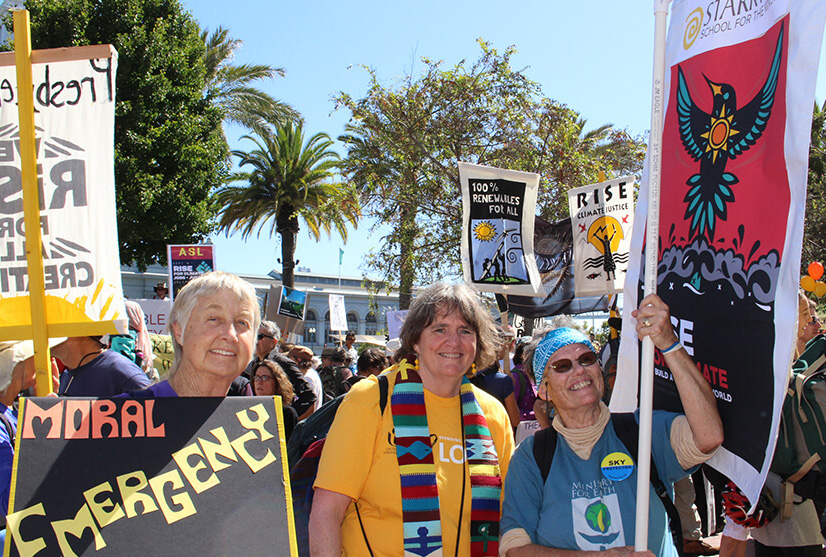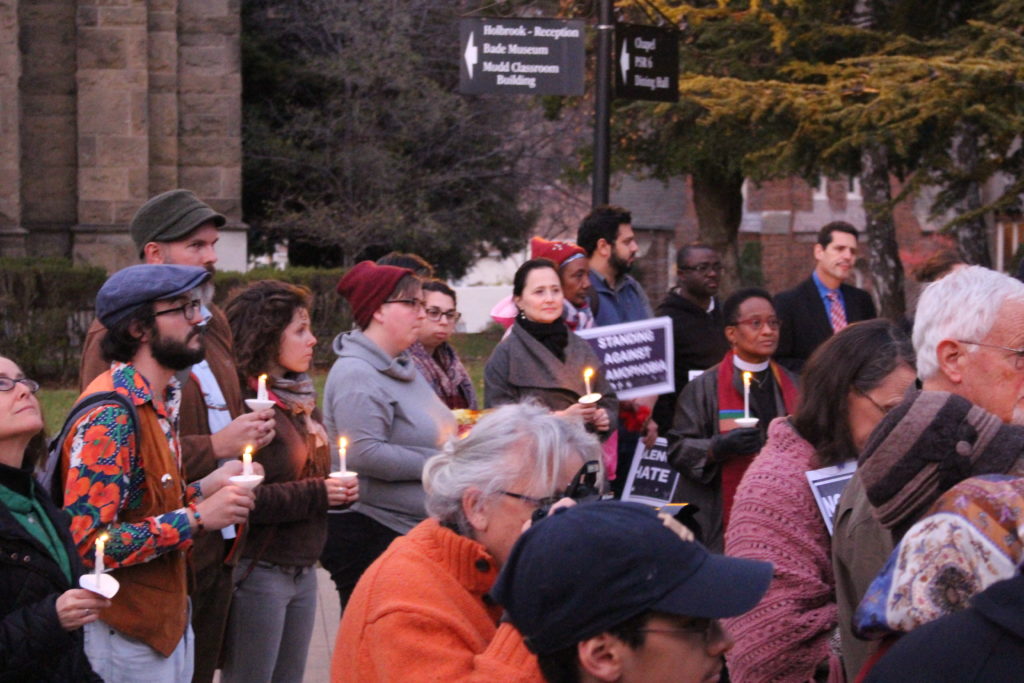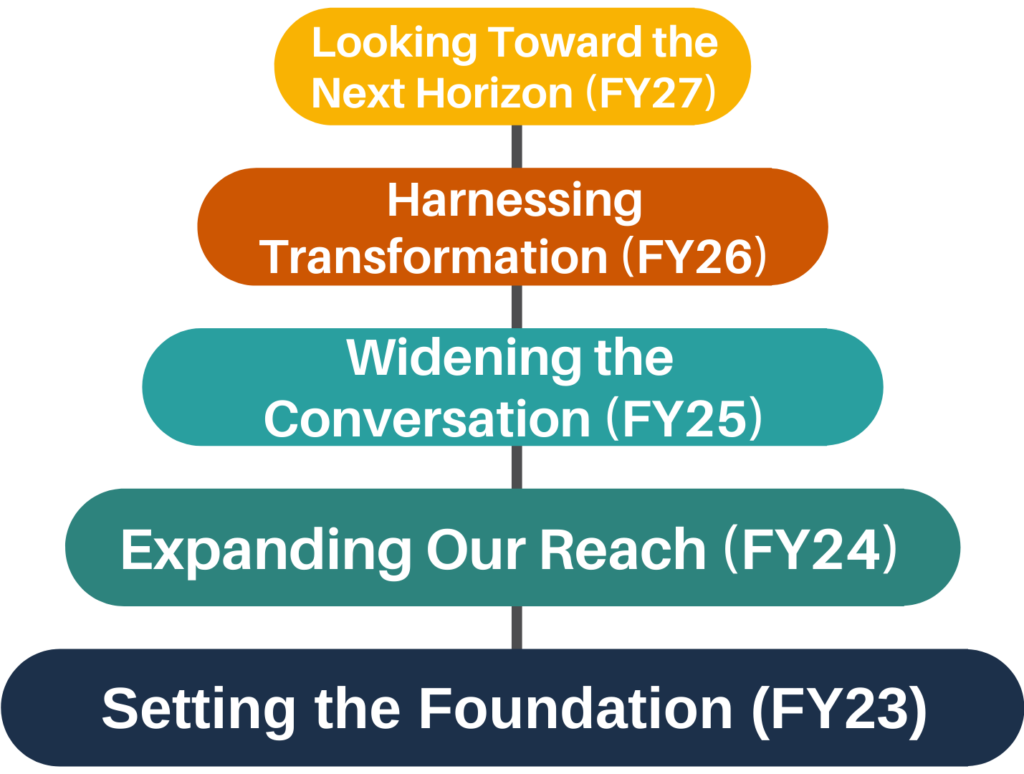
Five Year Roadmap
In 2021, the Starr King School for the Ministry began the process of (re)imagining where the school can be in five years. This process, stretching over more than a year, centered on the school’s goal of becoming the hub for counter-oppressive theological education in the next five years.
The process began in the Summer and Fall of 2021, with core groups within the school participating in visioning sessions to reflect on what it means to be the hub for counter-oppressive theological education and what it would take to achieve that goal. In the Winter and Spring of 2022, the ideas generated from those visioning sessions were reviewed and refined by several members of the staff, faculty, and board to prioritize and clarify the possible pathways Starr King can take to reach that desired destination.
Based on that collective visioning and prioritization, a Five-Year Roadmap has been developed which details both our desired destination and a compass direction to reach that desired destination. In this roadmap, each fiscal year focuses on a framing idea and guiding questions to help the school make decisions on which paths to pursue to become the hub for counter-oppressive education in five years.
Becoming the Hub: Understanding Our Desired Destination
The starting point for Starr King’s (re)imagining process centered on the school’s goal to become the hub for counter-oppressive theological education in five years.
As a result of our visioning sessions with Starr King staff, faculty, students, and board members, we now have a clear understanding of the desired destination we seek to reach and a way of defining what being the hub for counter-oppressive theological education means for us.
As the hub for counter-oppressive theological education, Starr King will be a recognized authority on educating to counter oppressions, standing at the intersection of academic scholarship and practice. We will be a driver of justice conversations, a thought leader in theological education and religious leadership, a sought-out resource by established practitioners and by seekers of change, and one of the best schools for religious and lay leaders to learn how to engage in sacred social change work.
Our expansive and diverse educational opportunities, including and beyond our degree programs, will offer multiple pathways for religious leadership and careers in sacred social change. Our curriculum, centered around educating to counter oppressions and create just and sustainable communities, will enable our students to become the leaders our world needs and will model how to do theological education in the 21st century. The variety of programs, classes, and workshops available will allow more people to learn from and study at Starr King.


Additionally, as a school we will embody our mission and ECO-commitment in our community and in our daily operations, supporting and celebrating our staff, faculty, and students. Our robust operations will support our work and enable us to bolster our activities. As a community, we will be bold, innovative, and unashamed, guided in word and action by the school’s vision and mission.
Over the next five years, we seek to establish our place as the hub for counter-oppressive theological education by bolstering our offerings and programs, our outward engagement, our internal structure and support, and our community and culture.
Our Programs and Offerings
By July 2027, Starr King’s degree programs will be well-known and nationally recognized for how we help our students become religious and lay leaders who engage in and lead cutting edge counter-oppressive work in communities and congregations across the globe. We will lead the way with a theological education that matches the needs of 21st century religious leadership in a COVID-normalized world.
We will offer a Master of Divinity degree, a Master of Arts in Social Change, and a Doctor of Ministry program. We will have several thriving concentrations within our degree programs that prepare our students for different forms of religious and lay leadership. We will also have several certificate programs designed to help people prepare for different forms of leadership in religious and secular spaces, including our alumni, long time ministers, lay leaders, and others interested in leading sacred social change work across their organizations and industries.
Beyond our various formal programs, Starr King will offer a variety of community and public classes, workshops, seminars, and programs designed to better equip religious and lay leaders to engage in counter-oppressive sacred social change work. Starr King’s Center for Multi-Religious Studies will become a recognized leader in multi-religious scholarship and practice. Our annual Symposium will be a landmark program of our school and our thriving global immersion programs will attract participants from beyond the borders of Starr King.
The variety and diversity of offerings we develop by July 2027 will enable more people engage with and learn from Starr King.
Our Outward Engagement
By July 2027, Starr King will be recognized as an authority on transformative counter-oppressive theological education. We will be a robust online and physical resource for those who want to engage in counter-oppressive work. We will be an active driver in conversations around justice, sacred social change, religious leadership, theology, and multireligiosity. And we will be known as the school that produces the leaders of justice movements and transformative congregations and communities.
While Starr King has a physical home base in Oakland, we will regularly gather across the country and around the world, as well as virtually, ensuring access to Starr King educational opportunities no matter where you are. We will thoughtfully engage and partner with like-minded progressive institutions in the arts, in education, in business, and in philanthropy to strengthen our work.
Starr King will produce and publish meaningful scholarship, commentary, and guidance for practice around countering oppressions, creating just and sustainable communities, Unitarian Universalism, multireligiosity, religious leadership and practice, theological education, and other related disciplines. Additionally, Starr King will produce tools and resources for communities, congregations, change agents, people of faith, and others to use to engage in counter-oppressive sacred social change.
Our faculty, staff, and students will all be engaged in this outward facing work, including through written scholarship, media commentary, workshops, events, and conferences around the world. Moreover, our graduates will be the greatest representations of our transformative educational model.
Our Internal Structure and Support
By July 2027, Starr King will have the resources – financial, technological, and human – to fully support our work as the hub for counter-oppressive theological education. The school will be financially sustainable, with robust and diverse revenue streams supporting our operations and ensuring that our staff, faculty, and students are supported in their work.
Starr King’s strong, well-developed, and equitably paid staff and faculty will enable us to fully support our current activities while continuing to pioneer new avenues of learning and engagement for our community. Additionally, our diverse and well-known faculty will have the support to teach, do research, and participate in community and academic conferences.
Starr King will also have taken numerous steps to make school more affordable and accessible to students, particularly through increased scholarships for students. Additionally, through investments in technology, we will ensure that Starr King is an accessible learning environment for all.
Finally, by July 2027 everyone within the school – our staff, faculty, board, and students – will be equipped to be ambassadors of Starr King.
Our Culture and Community
By July 2027, Starr King will be a model for what it means to be a robust, transformative community with a global reach. We will serve more and a greater diversity of people than ever before. Our community will be equipped to support and enable the continuous transformation that Starr King has always been known for.
Our staff, faculty, board, students, and alumni will be active collaborators with each other help the school grow and achieve its goals. To support our community, our staff, faculty, and board will all play a role in fundraising, recruiting, and supporting our students to ensure their success. We will have an engaged alumni network that actively mentors and supports our current students. Moreover, the work within and beyond the school done by members of the Starr King community will recognized and celebrated.
Starr King’s student base will be larger and more diverse than ever, growing each year to serve more and different kinds of students who can benefit from a Starr King education. We will effectively balance our UU and multi-religious identity, creating a community that reflects the multireligiosity we see in the world while also protecting and preserving Unitarian Universalism’s future.
By July 2027, we will have built a vibrant, supportive, and healthy community, enriching and that is enriched by our work.
The Framework
The following roadmap framework provides a compass direction toward our desired destination. By giving us a compass direction, this framework seeks to provide sufficient clarity to guide discernment as we determine our next steps and path(s) to take, while giving Starr King the flexibility to veer slightly off to another path if needed so long as that path still points the school in the direction of our desired destination.

The framework is organized into five parts, aligning with the next five fiscal years (FY). Each part is focused on a singular, framing idea for how the school can advance towards its desired destination during that year. As we move through the framework, each subsequent part builds off what came before, leading us to the end of FY27 and our desired destination – Starr King becoming the hub of counter-oppressive theological education.
By focusing our energies on these framing ideas and by utilizing the guiding questions outlined for each fiscal year, we can explore a variety of different paths to reach its desired destination. To ensure we are progressing through this roadmap, we will regularly assess progress toward our desired destination over time, as well as any needs and opportunities that arise. Benchmarks will be established as part of that assessment as we enter into each new fiscal year. These benchmarks will be based on the answers to the guiding questions for that year, as well as the needs, opportunities, and priorities of the school.